
20 Product: Spotify's Gustav Söderström on Why Product is 100% Science and 0% Art, Why You Should Look at the Competition and then Do Something Completely Different & Why Talk is Cheap and Product Teams Should Do More of it; Structuring the Best Debate
Gustav Söderström is Spotify's Chief Research & Development Officer. He has the CPO & CTO responsibility, overseeing the product, design, data, and engineering teams at Spotify and is responsible for Spotify's product strategy. Gustav is also an entrepreneur and investor who has founded and sold startups that he co-founded to Meta's Oculus in 2014 and then also his first startup which he co-founded and led as CEO, up until their acquisition by Yahoo! Gustav is also the host of the podcast mini-series -- Spotify: A product story -- which offers a glimpse into the decisions that have guided Spotify's product evolution. In Today's Episode with Gustav Söderström 1.) From Selling Companies to Yahoo and Meta to Leading Spotify's Product: How did Gustav first make his way into the world of tech and startups? What was it that made Gustav so compelled to join Daniel Ek and build Spotify? What does Gustav know now that he wishes he had known when he started? 2.) "Never Fight a Macro Wind": What does Gustav mean when he says "never fight a macro wind"? What models can product leaders construct to measure the size, importance and timing of a macro wind? What can product leaders do to change the macro wind and have it blowing in their back and not their face? When did Gustav experience this? What did he change to have the wind blow in his back? How did this alter his mindset and mentality? 3.) "Do Something Completely Different to the Competition": Why does Gustav believe startups should do the complete opposite to the competition? Does this change if your competition is other startups vs incumbents? What is the story of how Spotify did the complete opposite to Youtube? Why did it work? On the flip side, when did Spotify do the complete opposite and it did not work out? 4.) Mastering the Learning Process: How does Gustav approach the learning process for all new skills and disciplines? Why does Gustav believe that all technology leaders have to be the master of their domain? How did this lead to Gustav going back to University to study machine learning? What are the single biggest mistakes people make in the learning process? 5.) Gustav: The Product Leader: Why does Gustav believe that product is 100% science and not art? What does Gustav mean when he says, "talk is cheap and so we should do more of it"? How does Gustav structure internal debates? Who sets the agenda? Who is invited? What makes a good vs a bad internal debate? How does Gustav make everyone feel safe? What can leaders do to ensure an environment where everyone feels they can debate with the boss? 6.) Spotify: The Crucible Moments: What is Gustav's favourite near-death experience in the Spotify journey? Why did Spotify decide to make the move into podcasting and video? How does that additional complexity change the product paradigm of an audio-only platform? How do the single most impactful platforms in the world approach market expansion and when to add new products? What are the best companies in the world not merely technology innovations but also business model innovations? Items Mentioned in Today's Episode: EXCLUSIVE NordVPN Deal ➼ https://nordvpn.com/20vc Try it risk-free now with a 30-day money-back guarantee!
12 Loka 20221h 8min
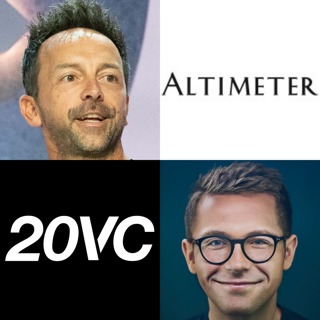
20VC: Altimeter's Brad Gerstner on Why Supercycles and the Powerlaw is the Most Important Thing In Investing, Why Portfolio Diversification is the Opposite of Risk Mitigation and The #1 Question Brad Asks All New Recruits
Brad Gerstner is the Founder and CEO of Altimeter, a life-cycle technology investment firm that manages public and private portfolios. Brad has personally participated in more than 100 IPOs as a sponsor, anchor, and investor. Brad's notable deals include Snowflake, Mongo, Bytedance, Gusto, Unity, Okta, dbt, Modern Treasury, EPIC Games, Hotel Tonight, and Zillow. Prior to founding Altimeter, Brad was a 3-time co-founder where he sold all three businesses (to IAC, Google, and Marchex), a founding principal at General Catalyst; a securities lawyer, a former Deputy Secretary of State of Indiana, and a pilot. In Today's Episode with Brad Gerstner We Discuss: 1.) From Humble Beginnings in Indiana to 100 IPOs: When did Brad realize his original love of finance and entrepreneurship? What one single question does Brad ask all potential new recruits to determine if they have hustle? What does Brad know now that he wishes he had known at the beginning of his career? 2.) The Power Law and Supercycles: What is a power law? Why is it the single most important thing in investing? How do the best investors in the world build a framework around supercycles? How does Brad approach market sizing? How does Brad think about market creation when aligning that to his thesis of investing in power laws? How does Brad determine if a large opportunity is a "super-cyle" or a short, time-stamped fad that is unsustainable? How does Brad assess the importance of market timing? 3.) Building Anti-Fragile Portfolios: Portfolio Construction: Why does Brad disagree that the answer to risk mitigation is portfolio diversification? How many companies is enough companies for a diverse portfolio? Price Sensitivity: How does Brad reflect on his own relationship to price? How does this process and mindset change on re-investments? What is needed for Brad to re-invest? Time to Exit: How does Brad analyze when is the right time to exit a position? What are the single biggest mistakes people make when it comes to timing their exit? 4.) The Venture Landscape: Today, What is Happening? Why does Brad believe what has happened over the last 24 months is a great disservice to founders? What are the biggest examples of a complete lack of investor discipline? Why does Brad believe that for all positions valued over $500M, we should apply a 20% discount? Is today's pricing actually just the new normal? How has the public market pricing impacted the deployment of growth stage checks? How will this play out in the next 12 months? Why does Brad believe there is "not blood on the streets yet"? How does the speed of interest rate change impact our ecosystem so dramatically? Items Mentioned in Today's Episode: Brad's Favourite Book: The Snowball: Warren Buffet and the Business of Life
10 Loka 20221h 8min
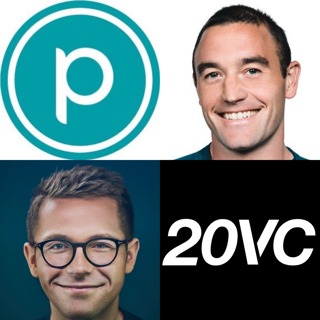
20VC: Kevin Weil on The Biggest Lessons from Leading Product at Instagram and Twitter | How Working With Kevin Systrom Impacted His Approach To Product | 3 Things Instagram Did To Make Stories So Successful and Why Investing Makes Operators Better at Thei
Kevin Weil is President of Product and Business @ Planet and Operator in Residence @ Scribble Ventures. In the past, Kevin has been Head of Product at Twitter, Instagram, and Novi (the digital currency effort within Facebook). During his seven years at Twitter, he helped the company scale from 40 to 4000 people and from $0 to $2B in revenue. He then moved to Instagram in 2016 to lead the product and data teams and led through an inflection point as Instagram grew from 400M to over 1B users, including launching Instagram Stories. Kevin then co-founded Diem (formerly known as Libra) and Novi and built both for three years before moving to Planet in 2021. If that was not enough, Kevin is also on the board of Strava, the Nature Conservancy, and the Black Product Managers Network. In Today's Episode with Kevin Weil We Discuss: 1.) Lessons From Leading Product for Instagram and Twitter: What does Kevin believe makes Instagram so inherently good at product? How did leading product for Instagram change the way Kevin thinks and operates? What are 1-2 of Kevin's biggest lessons from working with Kevin Systrom, Instagram's Founder? What are the biggest takeaways for Kevin from leading product at Twitter? 2.) Launching Products, Customer Discovery and Product Sessions: What were Kevin's biggest learnings from launching Instagram stories? How did Kevin's conviction impact the product building and success of Instagram stories? How does Kevin advise founders on the best way to approach customer discovery? What are the best questions to ask to reveal the truth? How does Kevin approach product testing today? Why does Kevin not like softly softly testing new products? 3.) Kevin Weil: Leadership 101 What are some of the biggest leadership mistakes that Kevin made in his time at Twitter? How does Kevin approach decision-making frameworks? How does one balance the speed vs the quality of the decision? What makes a great product strategy? Where do so many go wrong in their product strategy? How do the best leaders communicate with their team? How does this change over time? What is Kevin's preferred medium and style of communication with his teams? 4.) Kevin Weil: The Athlete, Father and Husband: Kevin is an ultra-marathon runner, what does his training routine look like? What 1-2 changes has Kevin made that have had the biggest impact on performance? How does Kevin manage, investing, advising, training and being a father and husband?
7 Loka 202244min

20VC: The Rippling Memo: Bedrock's Geoff Lewis on The Conviction Building Process to Write a $200M Check and Co-Lead Rippling's Series D | Why No Competitor Can Out Execute Rippling | Uncapped SAFE's Why You Should Never Do Them and Why Geoff Broke The Ru
Geoff Lewis is a Founder and Managing Partner of Bedrock, one of the breakout and new venture firms of the last decade, famously in search of narrative violations. He serves or has served on the Board of Directors for companies including Lyft (NASDAQ: LYFT), Nubank (NYSE: NU), Epirus, and Vercel. Additionally, he has led sizable early-stage venture capital investments in dozens of companies including Upstart (NASDAQ: UPST), Tilray (NASDAQ: TLRY), Leafly (NASDAQ: LFLY), Wish (NASDAQ: WISH), Workrise, and Rippling. Prior to founding Bedrock, Geoff served as a partner at Founders Fund for several years. In Today's Episode with Geoff Lewis: 1.) Meeting Parker Conrad: A Generational Defining Entrepreneur: How did Geoff first come to meet Parker Conrad, over a decade prior to making the first Rippling investment? What was it about Parker that compelled Geoff so much in the early days? How did Geoff analyze the chip on Parker's shoulder from Zenefits? How does he believe it has driven him with Rippling? 2.) Searching for Narrative Violations in Rippling: Why does Geoff believe Parker himself is a "narrative violation"? What does Geoff believe is the foundational narrative violation in the way Parker is building Rippling? Rippling has a large portion of its team as former founders, how does Geoff believe this impacts the culture of Rippling? What does Geoff believe are the single biggest barriers to Rippling being the "App Store for Business"? On the upside case, if Rippling goes right, how big could this be? 3.) Rippling: The Financing: What has been Geoff's biggest lesson on price and price sensitivity that he has learned through Rippling? Why does Geoff never do uncapped notes? Why did Geoff break that rule with Rippling? What gave Geoff the conviction to write Bedrock's largest ever check in Rippling's Series D? What was the massive mistake that both Geoff and Bedrock made in not financing their Series C? 4.) Geoff Lewis: The Investor What single trait does Geoff believe all generational defining founders share? How does he test for it? Does Geoff believe he has a chip on his shoulder today? How has his relationship to the chip on his shoulder changed over time? To what extent does Geoff engage in outcome scenario planning when making investments? What upside scenario plan does Geoff need to be able to see for him to make an investment? Has Geoff ever lost money in an investment? What were his takeaways from this experience?
5 Loka 202248min
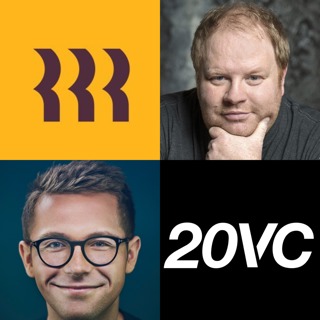
20VC: Rippling's Parker Conrad on The Four Main Benefits From Building a Compound Startup | Why There Should Never Be a Trade-Off Between Speed and Quality | How Zenefits Gave Parker a Chip on the Shoulder and Why That is so Important?
Parker Conrad is the Founder & CEO @ Rippling, the company that lets you easily manage your employees' payroll, benefits, expenses, devices, apps & more—in one place. To date, Parker has raised over $697M for Rippling from some of the best including Sequoia, Founders Fund, Greenoaks, Bedrock, Kleiner Perkins and Initialized to name a few. Prior to founding Rippling, Parker was the Co-Founder and CEO @ Zenefits and if that was not enough, Parker is also a prominent angel having invested in Census, Pulley and then also AgentSync and TrueNorth, alongside 20VC Fund. In Today's Episode with Parker Conrad: 1.) Entry in Startups and Zenefits: How did Parker make his way into the world of startups? How did Parker end up being kicked out of his own company, Zenefits? How did he respond? How did that experience of being kicked out of Zenefits inspire him to build Rippling? 2.) Parker Conrad: The Leader: How does Parker define "high performance"? How would Parker describe his leadership style today? Why does Parker fundamentally disagree that with speed comes a trade-off in quality? How does Parker ensure Rippling does all things fast and to the best of its ability? How would Parker break down his decision-making framework today? How does he decide what to prioritize vs not? How does he decide what to delegate vs not? What are Parker's biggest insecurities in leadership today? How have they changed over time? What does Parker do to combat and mitigate them? 3.) Rippling: The Compound Startup How does Parker define a compound startup? What types of business do this verticalized approach work for vs not work for? What does Parker believe are the 4 core benefits of this approach? What are the single biggest challenges of building a compound startup? 4.) Rippling: The Economics: How does this compound startup approach impact ability to cross-sell? How much net new ARR today comes from cross-sell? What have been some of Rippling's biggest lessons on what it takes to do cross-sell so effectively? How do the margin profiles differ across their different products? How have the margin profiles changed over time? Why does Parker not believe that most startup margins are accurate? How does the compound startup approach change the amount invested in R&D? How does that impact the fundraising requirements of the business? 5.) Rippling: The Partner Ecosystem: How does Rippling think about building out the best partner ecosystem? What will it take for that to work? Why do Rippling want to introduce services that compete with their own products? Why do they not only build their own? How do the margins differ when comparing revenue share on partner products vs Rippling products? What are the single biggest barriers to this partner ecosystem working?
3 Loka 202245min
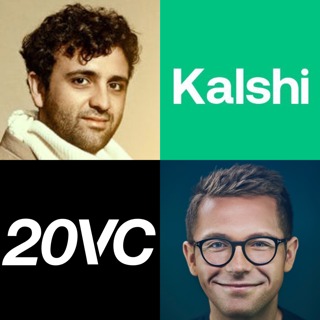
20VC: Lessons from Alfred Lin and Ron Conway | Why the World Does Not Want Your Startup To Exist and How the Best Founders Fight It | How To Build Moats and Defensibility Against Large Incumbents with Tarek Mansour, Founder & CEO @ Kalshi
Tarek Mansour is the Founder and CEO @ Kalshi, the first regulated exchange where you can trade directly on the outcome of events. Tarek has raised funding from some of the best including Alfred Lin @ Sequoia, Ali Partovi @ Neo, Ron Conway, Charles Schwab and Henry Kravis. Before founding Kalshi, Tarek worked at the likes of Citadel, Palantir and Goldman Sachs, in various different roles. In Today's Episode with Tarek Mansour We Discuss: 1.) Entry into Startups: How did Tarek make his way from a nerdy kid in Lebanon to having his first startup funded by Sequoia and billionaires likes Charles Schwab and Henry Kravis? How did his mother's continuous desire for excellence change Tarek's mindset? What are the biggest lessons that Tarek took from his mother's strict parenting and how did he apply them to how he manages the team at Kalshi today? 2.) What it Takes to Succeed: Why does Tarek believe that the world does not want your startup to exist? In that case, what are the core traits that founders need to fight this headwind? Does Tarek believe in work-life balance? What are some of the struggles of this? Does Tarek believe you should work on your weaknesses or double down on your strengths? 3.) Building the Team: Does Tarek believe that naivete is a strength or a weakness? At what point does it change between being a strength to being a weakness? Does Tarek prefer to hire more senior experienced people or younger hustlers with more energy? What have been the single biggest hiring mistakes that Tarek has made? How has it changed his approach to team building? What is the one single trait that if Tarek sees, he will not hire? How does Tarek make the interview process both fun but different and challenging? Where do so many founders make mistakes in how they construct the hiring process? 4.) Tarek Mansour: AMA: What have been the single biggest lessons from working with Ron Conway and Alfred Lin? What are some of Tarek's biggest insecurities in leadership today? What does Tarek know now that he wishes he had known at the beginning of his time with Kalshi? What would Tarek most like to change about the world of startups? Items Mentioned in Today's Show: Tarek's Favourite Book: Never Split the Difference: Negotiating as If Your Life Depended on It
30 Syys 202233min
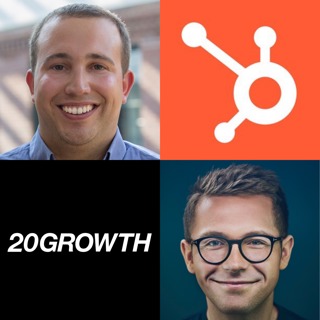
20Growth: Hubspot CMO Kipp Bodnar on Why the Best Marketers Think Like VCs | Why the Best Companies Do Not Start with Product Marketing | New Channels; When To Do, How Much To Spend, How To Test, When To Stop
Kipp Bodnar is the Chief Marketing Officer of HubSpot, where he sets HubSpot's global inbound marketing strategy. Prior to his role as CMO, Kipp served as VP of Marketing at HubSpot, overseeing all demand generation activity worldwide and building out the EMEA and APAC marketing teams. Kipp serves as a marketing advisor for SimplyMeasured, InsightSquared and Guidebook. Kipp is the co-author of "The B2B Social Media Book: Become a Marketing Superstar by Generating Leads with Blogging, LinkedIn, Twitter, Facebook, Email, and More." In Today's Episode with Kipp Bodnar We Discuss: 1.) The Journey to CMO @ Hubspot: How Kipp made his way into the world of marketing and came to be CMO @ Hubspot? What does Kipp know now that he wishes all CMOs knew when they started? 2.) Choosing The Channel: How does Kipp advise founders on which channel they should focus on? What is the framework which will tell them which channel is right for them? How many different channels should they try? How focussed should they be? Should they have independent teams for each channel? How do the best founders allocate resources to new channels? How do you know when one is not working and you need to stop? When do you just need to keep going and persisting? What have been some of Kipp's biggest mistakes when entering new channels? 3.) Product Marketing, Brand Marketing and Founders Marketing: How does Kipp advise founders who say that, "social and personal brand is just not for them"? In what two ways does Kipp believe that all businesses are constrained? Does Kipp agree that the state of product marketing has never been worse? What is truly great product marketing to Kipp? How does Kipp distinguish between good and great brand marketing? How has what it takes to be great at brand marketing changed over time? 4.) The Best Marketing People: What are signs of clear 10x performers in marketing? What advice would Kipp give to someone aspiring to be a CMO? What mistakes do 95% make that they should change? How do the best CMOs manage up and manage their team? Why does Kipp compare the role of the CMO to the general manager in NFL teams? Why does Kipp believe the role of the CMO is a lonely one? What are the hardest elements? What framework for learning does Kipp use to learn all new topics? What works? What does not?
28 Syys 202251min
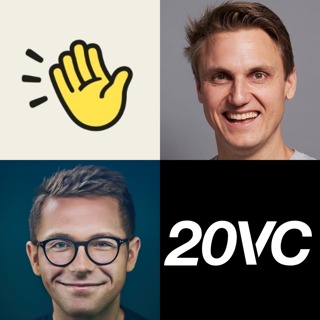
20VC: Clubhouse Founder Paul Davison on What Went Right and What Went Wrong | What Does Clubhouse Do Now To Regain Mindshare? | Why Clubhouse is not a Content Platform? | What is the Next Wave of Consumer Social and Does Web3 Play a Role? |
Paul Davison is the Co-Founder and CEO @ Clubhouse, the startup that believes people are at the centre of every moment, providing a platform to talk with friends and meet new friends. To date, Paul has raised over $310M with Clubhouse from a16z, DST, Elad Gil, Naval Ravikant, and many more. Prior to co-founding Clubhouse, Paul was the Founder of Highlight, a location-based consumer social service backed by Benchmark. Before Highlight, Paul actually spent time at Benchmark as an EiR. In Today's Episode with Paul Davison We Discuss: 1.) Entry into Startups: How Paul came to found Highlight in the early days of consumer social? What elements worked with Highlight that he took with him to Clubhouse? Which elements did not work that he learned from? 2.) Clubhouse: What Worked: What does Paul believe are the primary reasons that Clubhouse grew so fast? What metrics does Paul use to determine true product-market-fit and stickiness? What is good retention on Day 1, Day 7 and Day 30? How important is 12-month retention? 3.) Clubhouse: What Did Not Work: COVID: Does Paul believe that Clubhouse was the COVID antidote we all needed? How sustainable is that if so? What trends make it more sustainable? Live Does Not Work: How does Paul respond to Mike Mignano's comments that "live does not work"? Why does Paul believe that Clubhouse is not a content platform? Quality: Does Paul agree that the quality of live is not as good as the quality of produced content? Is that a problem? If the quality is worse, what is significantly better about live? 4.) The Future of Social: Does Paul agree that we are seeing the disregard of the once hailed social graph in favour of a new era of recommendation media? What does this mean for Clubhouse? With the rise of the likes of BeReal, how does Paul think about the importance of authenticity in the next wave of consumer social? How does Paul forsee Web3 and the next generation of consumer social being interlinked? What will it take for Web3 to break through? What are the core barriers today? Does Paul agree that the best consumer social tools empower creators with Superhuman powers? 5.) Lessons on CEOship: What are Paul's biggest lessons on successful company building? How does Paul manage the criticism and negativity of the press personally? How does Paul maintain the morale internally when the press cycle is so negative? How has Paul adapted himself to gain a thicker skin and not pay as much attention? Items Mentioned in Today's Episode: Paul's Favourite Book: Reality Is Not What It Seems: The Journey to Quantum Gravity, Information: A History, a Theory, a Flood
26 Syys 202237min






















